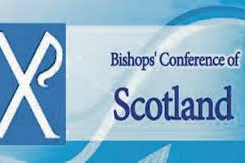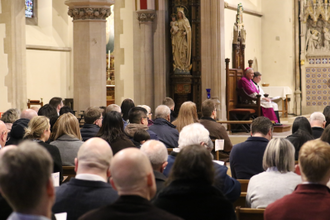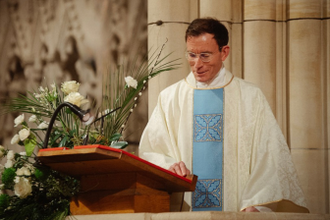Scotland: Church leaders urge withdrawal of controversial section of Hate Crime Bill to allow 'adequate consideration'

Source: SCMO
An unprecedented alliance of Catholic and Evangelical church leaders are urging the Scottish Government to drop part of its proposed Hate Crime and Public Order (Scotland) Bill to allow time for "detailed consideration of crucial provisions." The Bill, which would potentially criminalise any criticism of Transgender ideology has been criticised by the Catholic Church, the Free Church of Scotland and the Evangelical Alliance.
In a letter addressed today (Friday 12 February) to the Cabinet Secretary for Justice Humza Yousaf, the church leaders call for greater protections for freedom of expression and say:
"We believe that people should be completely free to disagree with our faith in any way, including mocking and ridiculing us. We are convinced that our faith is true and has a sufficient evidential basis to withstand any criticism, we therefore welcome open debate."
By contrast, concerns are raised that any disagreement with or criticism of Transgender identity could fall foul of the new law, if passed in its current form. The church leaders point out, that "Transgender identity has been subject of extensive and emotional public discussion. Such free discussion and criticism of views is vital as society wrestles with these ideas." They warn however, that they "cannot accept that any position or opinion at variance with the proposition that sex (or gender) is fluid and changeable should not be heard."
The letter marks the first time Catholic, Free Church and Evangelical Alliance leaders have jointly petitioned the Scottish Government and sought a meeting with the Cabinet Secretary for Justice. Supporting "open and honest debate" the letter ends with an assertion, that "A right to claim that binary sex does not exist or is fluid must be matched with a right to disagree with that opinion; and protection from prosecution for holding it." As well as a warning that: "The Parliament now has approximately four weeks to complete the passage of the bill. This is extraordinarily tight and risks inadequate and ill-thought through legislation being passed. No workable solutions to issues of freedom of expression have so far been suggested. If no such solutions can be found we hope the Scottish Government will now consider withdrawing the stirring up hatred offences in Part 2 of the bill to allow more detailed consideration and discussion and to ensure freedom of expression provisions, which enshrine free and open debate, are afforded the scrutiny they require."
The full text of the letter is shown below.
Humza Yousaf MSP
Cabinet Secretary for Justice
The Scottish Government
St. Andrew's House
Edinburgh
EH1 3DG
Friday 12th February 2021
Dear Mr Yousaf,
Hate Crime and Public Order (Scotland) Bill - Stage 2 amendments
We are writing to you as representatives of three communities of churches in Scotland in relation to the progress of the Hate Crime and Public Order (Scotland) bill at Stage 2 and to ask if we may be able to meet with you in the coming days in relation to this.
As you know we have engaged extensively throughout the bill process including a number of meetings with you and your officials, and all gave oral evidence to the Justice Committee on 10th November. In all of this we have sought to play a constructive role. We recognise the sensitivities involved in this bill, have sought consensus, and looked to help play our part in protecting vulnerable communities from hate crime whilst at the same time protecting fundamental freedoms on which we all depend for our common life. Our approach has never been to just narrowly consider the needs of our own communities only but rather to look at the impact of this bill across society.
As you know from the outset, we have had a number of concerns about this bill and these have been well represented in our evidence. These included plans to create new offences without intent, offences related to inflammatory material and the protection of freedom of speech. We are grateful for Scottish Government and Justice Committee consideration of these and the improvements that have been made to the bill in these first two areas.
However, central to the impact of this bill has always been the protections for freedom of expression. We were therefore very concerned at the approach outlined at the Stage 2 committee meeting on 2nd February that appears to take an entirely new approach to this issue with only a few weeks remaining until the bill must be passed at Stage 3. It appears that after eight months of discussion and scrutiny of the bill the approach to date has been discarded in a few short days, with very little time remaining for further discussion and engagement with stakeholders.
As Christians, we do not always agree with one another and know that many do not necessarily share or even understand our beliefs, but we are utterly committed to the free and open exchange of ideas in society. We believe that people should be completely free to disagree with our faith in any way, including mocking and ridiculing us. We are convinced that our faith is true and has a sufficient evidential basis to withstand any criticism, we therefore welcome open debate.
We therefore welcome amendments to Section 11 of the bill which clarify that, in relation to religious belief, mere expressions of antipathy, dislike, ridicule and insult are not, on their own, criminal behaviour together with the fact that this is extended to those of no belief as well. We support a robust approach to freedom of expression in relation to religion in the Bill, in accordance with Article 10 of the European Convention on Human Rights and we urge the Scottish Parliament to move forward with these amendments to ensure the rights of everyone in society to freely express their beliefs.
However, we are very concerned that a similarly clear and robust approach has not been taken in relation to other areas of the bill, as was previously proposed, in favour of what appears to be a catch all freedom of expression statement on the face of this bill. Whilst any statement to that effect would be welcome there are very real dangers that this general nature amounts to a watering down of protections as the detail of specific protections is lost, meaning that there would be continued uncertainty for prosecutors, courts and most importantly the general public, about the operation of the bill. Those concerns, which Ministers, officials and committee members have spent months trying to address, now appear at risk of being discarded in a rush to find a general statement that can be agreed. We note the commitment of all parties to reset discussions on the freedom of expression provisions in the bill. However, we are disappointed that these months of discussions on the bill, including extensive input from stakeholders, now appears to be in danger of being set aside.
Specifically, we have concerns in relation to the approach taken to Section 12 in relation to sexual orientation and the approach taken to the issue of transgender identity - an issue raised almost weekly during the committee evidence sessions. In both these areas we must all be careful to distinguish between hateful, nasty, vicious, or malevolent attacks on the person on one hand, and disagreement or dispute with an ideological position on the other.
While welcoming the inclusion of protection for discussion of criticism of sexual conduct and practices, we urge the Scottish Parliament to extend this to also allow for discussion and criticism of marriage which concerns the sex of the parties to the marriage. When marriage between parties of the same sex was introduced in Scotland assurance was given that no religious body would be forced to conduct them, implicit in that assurance was protection for those who expressed doctrinal disagreement with such marriages.
We also welcomed proposed amendments in relation to a new clause relating to Freedom of Expression in relation to transgender identity. Transgender identity has been subject of extensive and emotional public discussion. Such free discussion and criticism of views is vital as society wrestles with these ideas. While we acknowledge the difficulties and struggles experienced by those with Gender Dysphoria and are acutely aware of the sensitivities involved from our own pastoral care settings, we cannot accept that any position or opinion at variance with the proposition that sex (or gender) is fluid and changeable should not be heard. Open and honest debate on the very essence of the human person should never be stifled. We believe provision must therefore be made in the bill for discussion and criticism of views on transgender identity without fear of criminal sanctions. A right to claim that binary sex does not exist or is fluid must be matched with a right to disagree with that opinion; and protection from prosecution for holding it.
The Parliament now has approximately four weeks to complete the passage of the bill. This is extraordinarily tight and risks inadequate and ill-thought through legislation being passed. No workable solutions to issues of freedom of expression have so far been suggested. If no such solutions can be found we hope the Scottish Government will now consider withdrawing the stirring up hatred offences in Part 2 of the bill to allow more detailed consideration and discussion and to ensure freedom of expression provisions, which enshrine free and open debate, are afforded the scrutiny they require.
We look forward to hearing from you and hope to be able to meet with you soon.
Yours sincerely,
Anthony Horan, Director of the Catholic Parliamentary Office of the Bishops' Conference of Scotland
Stephen Allison Assistant Clerk of the Free Church of Scotland.
Fred Drummond, National Director of the Evangelical Alliance Scotland
(CC Mr Adam Tomkins, Convener of Scottish Parliament Justice Committee)


















